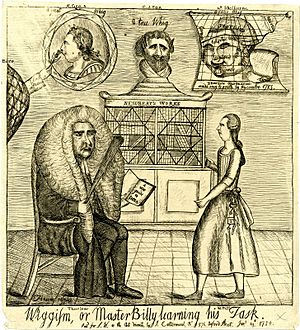Whiggism facts for kids

Whiggism is a political idea that started in England a long time ago. It grew out of a group called the Parliamentarians, who fought against the King during the Wars of the Three Kingdoms (1639–1651). The people who believed in Whiggism, called Whigs, thought that Parliament should have more power than the King. They also believed in being kind to different types of Protestants and did not want a Roman Catholic king, especially King James II.
After a big event called the Glorious Revolution in 1688–1689, Whiggism became very important in British politics. It was the main way of thinking until about 1760. Even though the Whigs split into different groups, their ideas were popular. Many important families, business people, and middle-class people believed in Whiggism. They liked new ideas and freedom. The people who disagreed with Whigs were called Tories. Whigs also didn't like Jacobitism, which was a movement that supported the old royal family and was more open to Roman Catholicism.
The name "Whiggism" first came from the Whigs in Britain. But the idea of "Old Whigs" was also used by American Patriots in the Thirteen Colonies. After America became independent, their version of Whiggism became known as republicanism.
What Does "Whiggism" Mean?
The word "whiggism" started being used very quickly after the political group "Whig" was named. By the 1680s, people were already using it. For example, in 1682, a writer named Edmund Hickeringill published a book called History of Whiggism. The name "Whig" itself probably came from a shorter version of "Whiggamore," which was linked to an event called the Whiggamore Raid.
How Whiggism Started
The main ideas of Whiggism came from the Wars of the Three Kingdoms. This was a big fight for power between the Parliament of England and King Charles I. This fight led to the English Civil Wars.
However, the Whigs and their ideas really took shape during a time called the Exclusion Bill crisis (1678 to 1681). During this crisis, a group in Parliament tried to stop James, Duke of York, from becoming king after his brother Charles II. They wanted to stop him because they found out James was a Roman Catholic. There was also a scare called the "Popish Plot" in 1678, where people feared a Catholic plan against the King.
A big part of Whiggism was being against "popery," which meant being against Roman Catholicism. But this was more than just a religious choice. Whigs believed that Roman Catholicism was linked to kings having too much power and having a large army that could control the people. As Sir Henry Capel said in Parliament in 1679, if you get rid of "popery," you get rid of unfair government and power.
Even though the Whigs couldn't stop James from becoming king, they later joined with William of Orange and removed James from the throne in the Glorious Revolution of 1688. This event made Parliament more powerful, which was a key idea of Whiggism.
A very important achievement for the Whigs was the Bill of Rights of 1689. This document made Parliament, not the King, the most powerful. It also said that elections for Parliament should be free, and people in Parliament could speak freely. It also aimed to protect all English subjects from "cruel or unusual punishment."
Different Kinds of Whiggism
Whiggism was not exactly the same everywhere. It had different forms in England and Scotland, even though they shared one Parliament after 1707. In England, Whiggism focused on making Parliament powerful and ensuring the king or queen was always Protestant. Scottish Whigs cared more about using power for religious reasons, like keeping the Church of Scotland strong and remembering the Protestant Reformation.
There were also Whigs in the American colonies. While their ideas were similar to those in Britain, they had their own special goals. As the American Revolution began, this American Whiggism became known as republicanism.
See also
- Whig history
- Patriot Whigs
- Radical Whigs
- Rockingham Whigs
- True Whig Party
- Whig Party (United States)
- Patriot (American Revolution)
 | Leon Lynch |
 | Milton P. Webster |
 | Ferdinand Smith |

